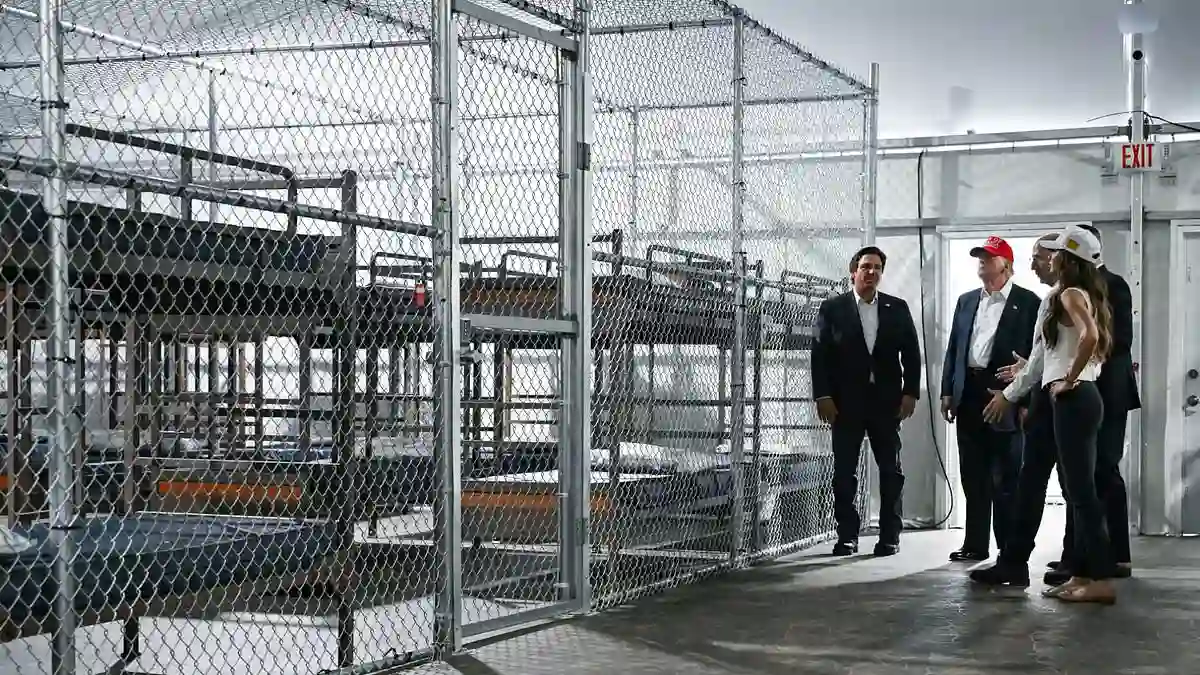The Trump administration is rolling out a major change in how it handles migrants who entered the U.S. illegally.
Under a new directive, millions of migrants will be required to stay behind bars throughout their deportation proceedings — which could drag on for months or even years.
This marks a big shift from previous policies where many migrants were able to post bond and live in the community while awaiting court decisions.
ICE Acting Director Orders No More Bond Hearings
Todd M. Lyons, the acting director of Immigration and Customs Enforcement (ICE), sent a memo on July 8 instructing agents to detain migrants for the entire duration of their removal proceedings.
According to Lyons, recent legal reviews by the Department of Homeland Security and the Justice Department concluded that these migrants “may not be released from ICE custody.”
This effectively ends bond hearings for most undocumented migrants.
What This Means for Migrants and Detention Centers
Previously, migrants facing deportation could request bond hearings, where a judge might allow them to be released on bond while their case played out in court.
Last year, ICE data showed most of the 7.6 million migrants on their docket were actually released.
But now, many will be forced to remain in detention centers indefinitely.
Currently, ICE holds around 56,000 migrants daily, but new funding under the recently passed “Big Beautiful Bill” is expected to nearly double detention capacity.
This bill allocates $45 billion over four years for expanded detention facilities aimed at speeding up deportations.
Who Is Affected by the New Rule?
The new policy applies broadly — covering anyone who crossed the southern border illegally over the past couple of decades, including migrants who arrived during the Biden administration’s surge in border crossings.
Only in rare cases can migrants still be released on parole, but that decision rests solely with immigration officers, not judges.
Legal Basis and Controversy Surrounding the Policy
The administration points to a section of immigration law that states migrants “shall be detained” after arrest, interpreting this as a prohibition on release.
However, for years this law was generally understood to apply only to people who had recently crossed the border.
Lyons acknowledges in the memo that this policy change is “likely to be litigated,” and he encourages ICE prosecutors to prepare legal arguments to support continued detention.
Meanwhile, immigration lawyers report migrants are already being denied bond hearings in multiple courts nationwide.
Critics Raise Concerns About Due Process and Detention Conditions
Advocates for immigrant rights warn this policy severely limits migrants’ access to due process, effectively allowing them to be detained indefinitely while waiting for deportation.
Some lawyers compare it to practices in a few U.S. immigration courts that have denied bond hearings to anyone who crossed illegally.
In one notable case, Ramon Rodriguez Vazquez, a migrant arrested after living in the U.S. for years and with a U.S. citizen family, was denied a bond hearing and deported back to Mexico despite a federal judge ruling he should get a hearing.
His attorney called the new policy “flagrantly unlawful” and said it aims to “supercharge detention.”
Supporters Argue Detention Prevents Abuse of the System
Those backing the change say detaining migrants ensures they cannot disappear while their cases are processed, which can take years given the immigration court backlog.
Mark Krikorian, head of the Center for Immigration Studies, called detention “the best way” to guarantee removal after a negative ruling — although he admitted it is expensive.
Certain groups of migrants, like those convicted of serious crimes, were already subject to mandatory detention without bond.
Recently, Congress expanded this to include theft-related offenses.
Family Detention Centers Reopen Amid Controversy
The government has also reopened family detention centers shuttered under the Biden administration, and reinforced facilities like the “Alligator Alcatraz” camp in Florida’s Everglades.
Democrats who toured the site condemned conditions as inhumane — citing overcrowded cages, poor sanitation, and reports of vermin in food.
Florida emergency management officials disputed these claims, accusing lawmakers of exaggerating conditions to score political points.
